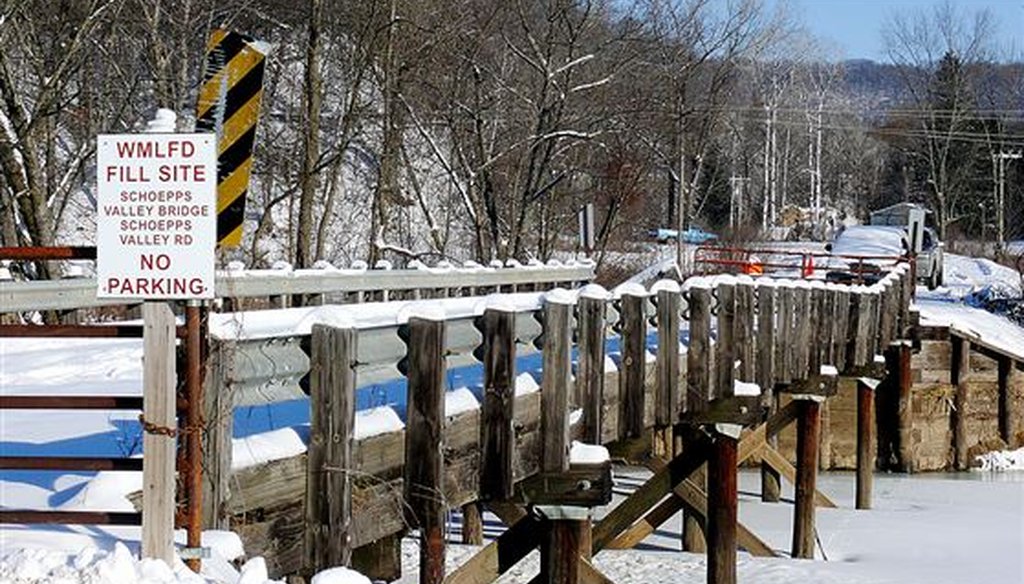

Our only agenda is to publish the truth so you can be an informed participant in democracy.
We need your help.


This bridge in rural Wisconsin has been closed to vehicle traffic since being damaged by flooding in August 2016. But it's still safe for pedestrians, including children catching a school bus. (Eau Claire Leader-Telegram)
Saying Wisconsin’s transportation needs are urgent, state Sen. Kathleen Vinehout, a potential candidate for governor in 2018, made an alarming claim.
"We have bridges in my own county that have been condemned," the Alma Democrat said Feb. 24, 2017 on Wisconsin Public Television. "And we still have school children that are crossing those condemned bridges in the middle of the winter to get to the school bus."
An unsettling image for rural Buffalo County, which is three hours northwest of Madison.
We found there are two bridges in the county so badly damaged that they are closed to vehicle traffic, though only one of them is traversed by children to get to and from their school bus.
And the word "condemned," while accurate in a colloquial sense, exaggerates the danger to kids.
Bridge worries
The need for improvements on Wisconsin’s bridges has gained attention in the past couple of years, even if the terms used to describe their condition might mean less than they seem.
In October 2015, we rated Mostly True a claim by La Crosse Democrat Jennifer Shilling, the state Senate minority leader, that 71 percent of Wisconsin’s roads were in poor or mediocre condition and 14 percent of its bridges were "structurally deficient or functionally obsolete."
Structurally deficient means suffering from deterioration to at least one major component, but not unsafe. Functionally obsolete means built using outdated standards, such as older design features.
Wisconsin’s figure has risen to 15 percent, according to a 2017 report by the American Road & Transportation Builders Association, with 1,232 bridges deficient and 783 obsolete.
How to pay for bridge work has been a persistent issue. A January 2017 audit by the nonpartisan state Legislative Audit Bureau noted that in a 2015 survey done by the bureau, only 50 percent of county highway commissioners said money for routine maintenance on bridges was adequate.
Meanwhile, Republican Gov. Scott Walker and the GOP-majority Legislature, as they work on Walker’s state budget proposal for 2017-’19, are debating about new taxes or other ways of funding road and bridge work.
Buffalo County
To check Vinehout’s claim, we called Buffalo County Highway Commissioner Bob Platteter. He said flooding caused by an August 2016 storm damaged the 125-foot Schoepps Valley Bridge, which spans Waumandee Creek, beyond repair. "It’s scrap," he said.
The bridge was closed to vehicle traffic, so in that sense it could be considered "condemned," Platteter told us -- but it was judged safe for pedestrian crossing, which continued until demolition began nearly seven months later, in March 2017. Nearby residents would drive their children to the bridge and the kids walked over it to catch the school bus, he said.
And to avoid a detour of up to 20 miles, some residents with multiple vehicles parked one on the road on one side of the bridge and one on the other side. Platteter said a new timber bridge is expected to be installed by the end of April 2017.
The Highway U bridge in Buffalo County partially collapsed one evening in February 2017, causing accidents two accidents that injured both drivers, though neither needed treatment. The collapse likely was also because of flood damage, Platterer said. That bridge is also now open only to pedestrians. But school buses use other county roads to pick up and drop off children in that area, he said.
Our rating
Vinehout says Wisconsin children are crossing "condemned bridges in the middle of the winter to get to the school bus."
Two bridges in Vinehout’s home county of Buffalo have been "condemned" in that they are too badly damaged for any vehicle traffic. But officials have determined that they remain safe for pedestrians, and children do use one of the bridges to get to and from their school bus.
For a statement that is partially accurate but leaves out important details, our rating is Half True.
div class='artembed'>Wisconsin Public Television, Kathleen Vinehout "Here and Now" interview (5:00), Feb. 24, 2017
Email, Kathleen Vinehout chief of staff Linda Kleinschmidt, Feb. 27, 2017
Eau Claire Leader-Telegram, "Troubled bridge over waters: Cochrane residents get creative to deal with washed-out span," Dec. 15, 2016
Interview, Buffalo County Highway Commissioner Bob Platteter, Feb. 28, 2017
Wisconsin Legislative Audit Bureau, "State Highway Program" audit, January 2017
Interview, Transportation Development Association of Wisconsin executive director Craig Thompson, Feb. 28, 2017
American Road & Transportation Builders Association, "2017 Bridge Report"
Interview, Wisconsin Department of Transportation spokeswoman Patty Mayers, March 2, 2017
In a world of wild talk and fake news, help us stand up for the facts.
